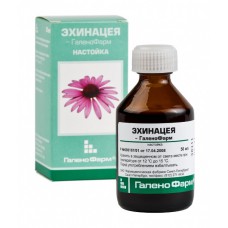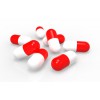Expiration date: 11/2026
Echinacea extract - immunostimulatory agent, an immunomodulator of plant origin.
The extract of Echinacea has antiseptic, anti-inflammatory and antiviral (against pathogens influenza and herpes) properties. Most studies confirm immune-boosting activity of Echinacea.
The plant Echinacea purpurea L. is traditionally used in various infectious diseases. The plant contains in its composition: polysaccharides, caffeic acid derivatives (including Echinacoside), polyacetylene, alkylidene amides (mainly isobutylamides), essential oils with sesquiterpenes. Had traces of pyrrolizidine alkaloids.
Apparently, the impact is to intensify the cleansing of the body from pathogenic microorganisms, viruses, and toxins. In particular, the influence of polysaccharides, alkaloidy amines and derivatives Kapinovo acid (but not echinoidea) gives the maximum effect. Alkaloid amines have an inhibitory effect on the lipoxygenase, and the number of derivatives Kapinovo acid and polyacetylene possess direct antibacterial activity. Oral ingestion of Echinacea significantly suppressed the process of tissue necrosis from injured rats.
Extract of Echinacea as a nonspecific stimulant that increases the body's resistance.
The extract of Echinacea increases the number of leukocytes (granulocytes, T-lymphocytes), activity of phagocytes, prevent the penetration of pathogenic germs into the organism, suppresses the proliferation and promotes elimination.
Extract of Echinacea lengthens the intervals between separate colds in the winter, softens the symptoms and reduces their duration.
Composition
the herb of Echinacea purpurea 10 g
Testimony
- strengthening the body's defenses,
- secondary immunodeficiency States of various etiologies (infection, radiation, chemotherapy,etc.)
- prevention of colds and flu and reduce their duration,
- predisposition to frequent colds,
- relief of symptoms of uncomplicated viral and bacterial diseases of the upper and lower Airways (rhinitis, pharyngitis, laryngitis, tracheitis, bronchitis, catarrhal colds),
- in the complex therapy of acute and chronic recurrent infectious diseases of the urinary tract,
- as a secondary drug during prolonged antibiotic therapy of chronic infectious diseases, which is accompanied by decreased immunity,
- for adaptation when changing time zones, climate, weather sensitivity.
The dosage regimen
Tincture is taken internally, diluted with a small amount of liquid, adults and children over 12 years: 20-30 drops 3 times a day. For better exposure through the mucosa of the oral cavity the drug for some time hold in the mouth.
Side effects
If you are sensitive to the Asteraceae allergic reactions: rash, swelling of the face, dyspnea, requiring discontinuation of the drug.
Special instructions and precautions
When storing the sample may turbidity or floc deposition of the active polysaccharides. Before use, the vial must be several times shake well.
The duration of continuous treatment should not exceed 8 weeks.
It should not be used with alcohol.
Influence on ability to concentrate: not required special precautions.
Contraindications
- hypersensitivity (including to plants of the family Compositae),
- progressive systemic and autoimmune diseases (tuberculosis, cancer, leukemia, multiple sclerosis, collagenosis, lupus erythematosus and other autoimmune diseases, AIDS or HIV infection),
- pregnancy, breast-feeding (lactation).
C caution. Chronic liver disease, alcoholism.
Pregnancy and lactation
Not recommended for use during pregnancy or breast feeding without prior consultation with the doctor.
Drug interactions
The alcohol part of the drug can change the effect of other drugs. Must not be used simultaneously cephalosporins (assign immunal through 3 days after the cancellation of cephalosporins).
Terms and conditions storage
Keep at temperature not exceeding 25° C. Keep out of reach of children.


